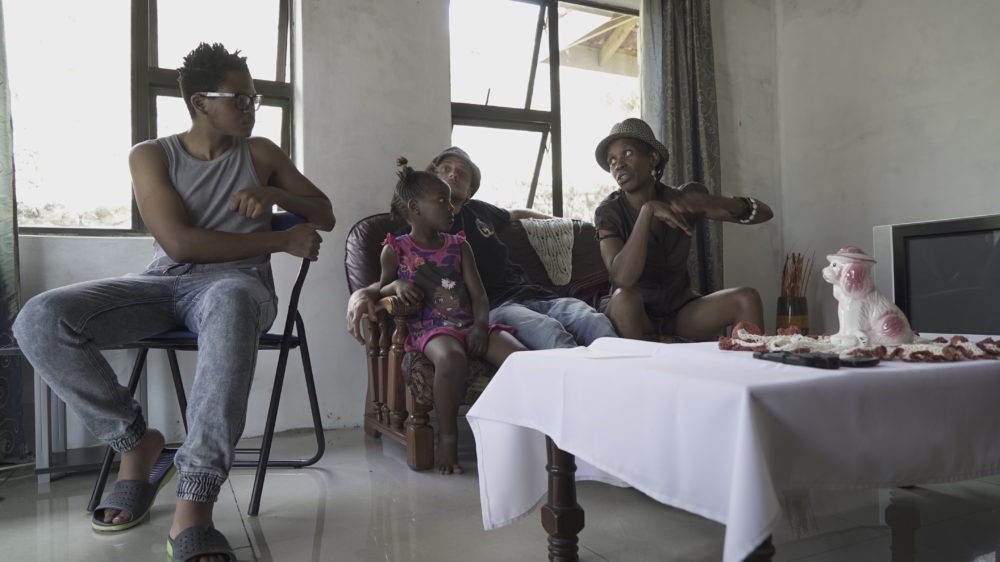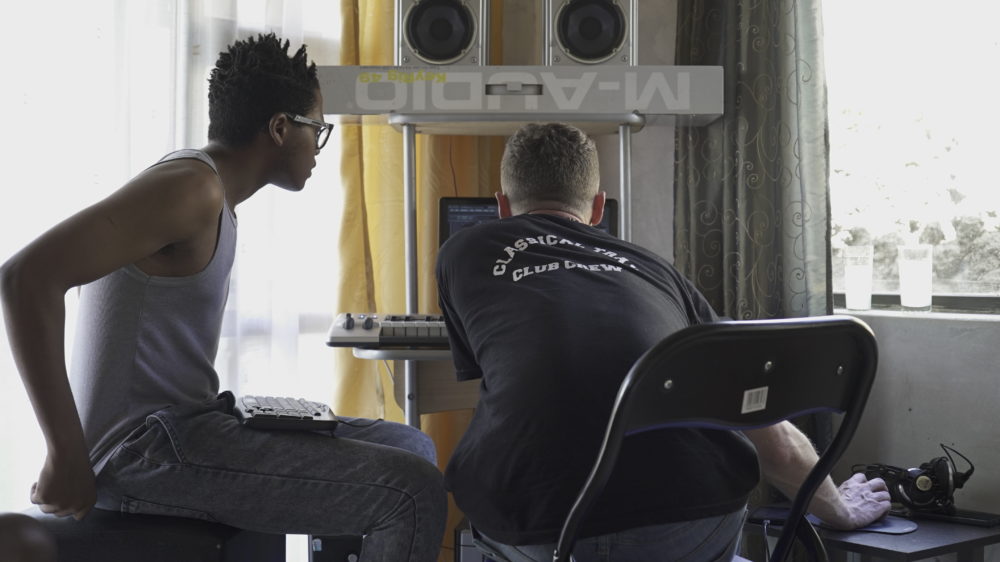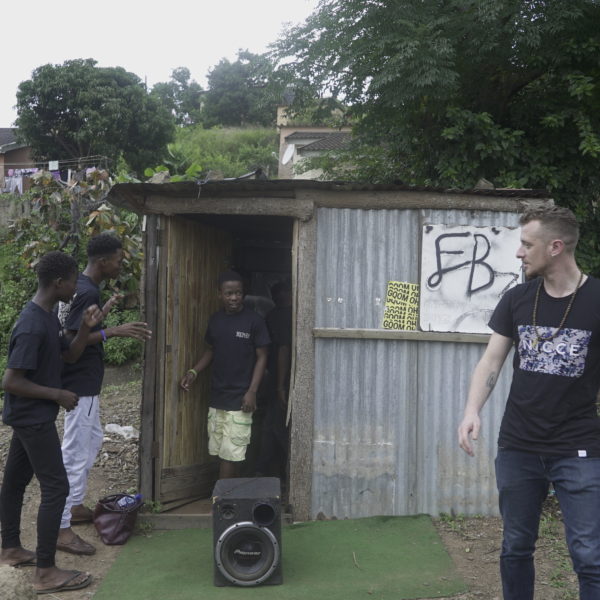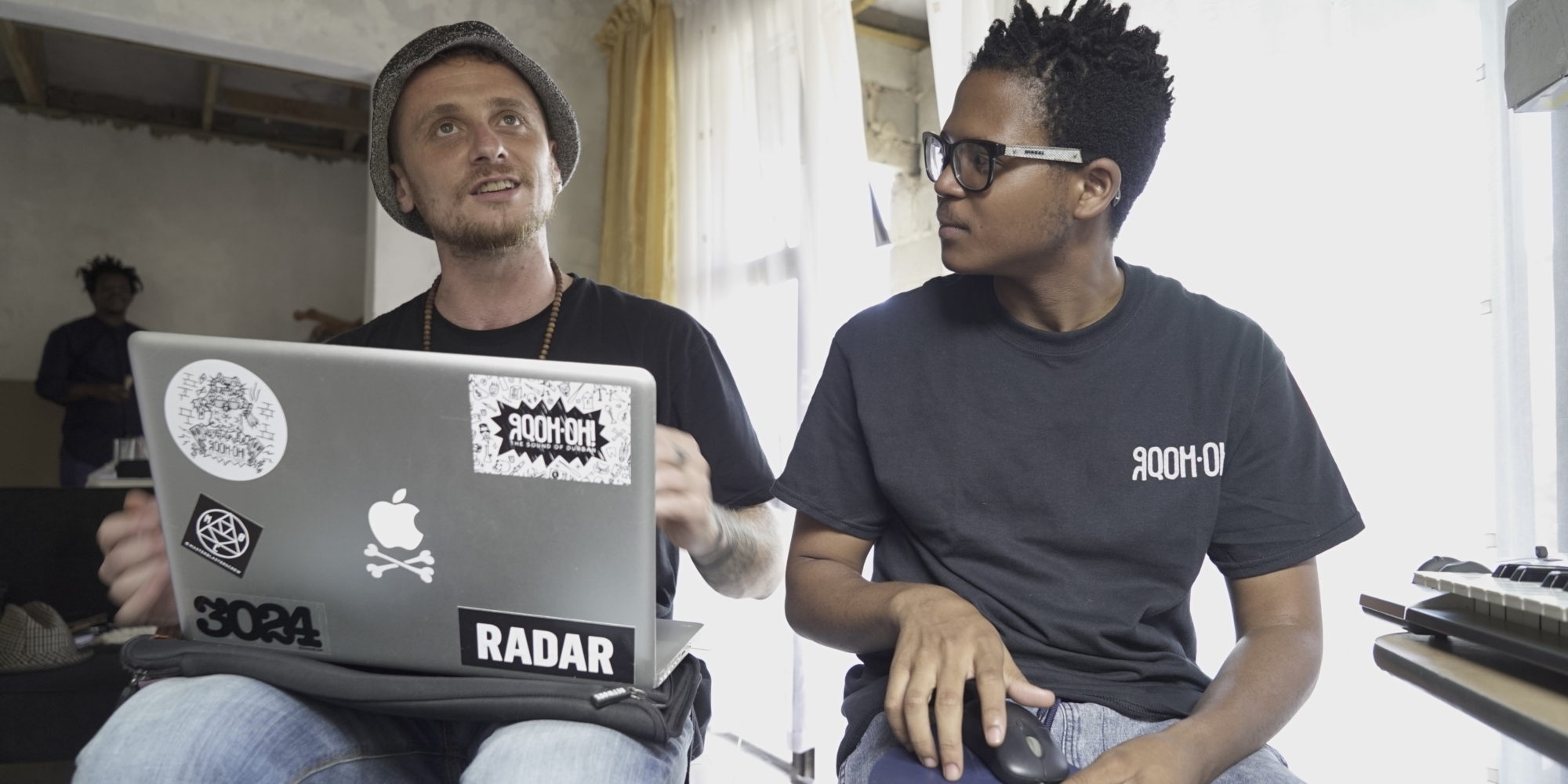Sboniso Brandon Luthuli, A.K.A. Citizen Boy, is one of the producers and DJs featured on the Afropop Worldwide program, “The Gqom Generation of Durban, South Africa.” Akornefa Akyea spoke with him via Skype while he was at home in Durban. Not only is Citizen Boy a young gqom creator but he also works as the assistant A&R of the Gqom-Oh! record label, started by Italian owner Francesco Nan Kolè, A.K.A. Malumz. Gqom-Oh! is dedicated to distributing gqom music internationally.
This conversation flowed seamlessly because Citizen Boy was so open about his experiences and opinions about gqom’s evolution. He wasn’t shy about critiquing how gqom has become more commercial, and broke down how to identify the new sound which he labels as sgubhu.
Akornefa: Good afternoon!
Citizen Boy: Good morning!
Where are you right now?
Right now, I’m at home, I was about to make music. Not that I was about to make music, I am making music right now. I’m in my bedroom. So called studio… bedroom studio.
What kind of equipment do you have with you?
Not a lot, I just got like monitors, laptop, like the proper-not exactly proper- basic studio stuff. The start-off studio equipment like my monitors, sound card, microphone, most importantly it’s my laptop. Because that’s what I use to make music.
Are you making music on FruityLoops?
Yes, that’s the only thing I’m making music on. No, it’s not the only thing but most of the time I use FruityLoops. I sometimes use Maschine Jam which I was given by Native Instruments but it’s quite difficult. But most of the time I just use FruityLoops because that’s where I started and that’s my comfort zone.
A lot of producers are using FruityLoops, right?
Yeah, that’s where we’re comfortable. Because it’s quite simple and easy. Everything is quite easy on FruityLoops.
When did you first start producing?
2011. Then I officially started producing in 2012. My uncle taught me a little bit of stuff and then I got the hang of it and was listening to some other music. And I started to get the feeling and had the groove to make music. Back then I used to call myself DJ Niso. I was in high school and stuff. I officially started in 2012 where I released some music on Kassie MP3. That’s when I started making music. Right now, I’m 19. So I was 12,13 and I’m still making it.
So is your uncle also a music producer?
He was but now he stopped. I’ve continued to legacy.
How did you get interested in producing gqom?
Where I heard about gqom… I first started taking buses. Our buses this side, they have like sound systems in them. They play music just to attract people. So I heard this genre called gqom in a bus. Back then I didn’t know what it was. I started losing my mind! The first song I heard was DJ Lag’s song called "Blast," and I was like “Oh my word, what is this?” It was so nice. And then after that, it influenced me to make music.
I started to download a lot of this sound called gqom. I started listening to Rude Boyz, Naked Boyz, all of them and then I got the feel of it. So I said, let me make this music because it’s nice. Let me express myself. I started making music on my laptop and my uncle was teaching me. He was teaching me how to make house music. It’s more of the Black Coffee type of music. But I didn’t like house, I liked gqom so I just shoved him on the side and continued with my style [Laughs]. And then after that, I started downloading music on Kassie MP3 and after some time, I realized I could be a member of this website and upload music and I did so. I used my phone to upload the song on those websites and promoted the songs via social media: Twitter, Facebook and WhatsApp. On Twitter, I used to be annoying. I used to tag almost everyone that’s a celebrity in S.A. so they can listen to my music. Yeah, I was quite annoying, I know [Laughs]. I was hustling. It paid off in the end. It’s all over the place right now. Back then it used to be on Facebook. That’s where you heard gqom. On Facebook.
Back then you were in school.
I’m still in school
What are you studying now?
I’m studying sound engineering.
Oh that’s perfect!
Yeah, I’m trying.
So you’re still in school and I’m sure your parents are proud.
Yeah, first my parents really didn’t support it. They were like “Nah, it’s nonsense.” And then, after Francesco came, everything changed. They started to supporting it. They saw that it’s gaining recognition and going somewhere. I think it’s up to me to show them that it is going somewhere.

With your music, how do you name the songs? A lot of it doesn’t have lyrics so when you make a beat or track, how do you go about deciding the name is “Ghetto Mafia” or “Tribute to DSB”
To be honest, I listen to the song and as I’m making the song, the name just pops up in my head. The question you’re asking right now, I’ve been asking people how do they do it? For me, it just pops up in my head and from then onwards, I’ll be like “Oh that’s 'Ghetto Mafia'.” To me it’s perfect. The song is actually dark. So as it’s dark, it reminds me of the ghetto. It’s sort of banging and it’s hard so it needed that hard name like the mafia. You get it?
I hear the darkness in there.
The darker the song, the deeper the word has to be. It can’t be like a light word or anything that’s soft, it has to correspond with the song.
When I listen to gqom, a lot of the songs sound dark. A lot of times they start with a dark string sound and then the beat comes on top or sometimes the beat starts first. Why has it taken on this dark character?
So there are different types of gqom. There are gqoms that are light and there are gqoms that are dark. For me, I make dark gqoms because of my room. My room is usually dark so I make music in a dark environment and that’s why you get something dark. I can’t make music in a bright open space. It’s not possible for me to be open and creative. I’m not sure why. I like the place to be dark in order for my creativity to flow.
I agree that there is light and dark gqom but I feel like a majority of it sounds dark. Do you think there’s...
Wait, so you’re saying Sho Madjozi sounds dark?
But is Sho Madjozi sgubhu or gqom?
It’s sgubhu.
I agree that a lot of sgubhu sounds light.
Yeah, sgubhu is lighter and the gqom is darker.
A majority of gqom is darker, but is there something about the environment, or Durban that translates into this dark sound?
The night times are dark. That’s what I can say. Gqom is made for parties and stuff. So I guess that’s why it is like that.
It’s meant to go along with the dark, club atmosphere?
Yeah, the club vibe. The night atmosphere basically. Yes.
When you’re producing, what’s your process. From the first thing until it’s done. You don’t have to give away all your secrets!
[Laughs] The first thing I do is I usually start with samples, like vocals. Then I put in my usual dark string. That’s what sets the tone of the song and the mood. And then I put some snares, claps and then end off with the kick. Most of the time I usually end of with the kick. I focus more on the sounds. Not the kick. And then after doing that, that’s the whole song and then I pace my song, arrange and then I save! Done! I think it’s simple.
I mean the music doesn’t sound simple. You make it sound easy but not everyone can do that.
I’m telling you, everyone can do it. I promise you. Even a 10 year old. Even 7. I can’t say 5 but 10 and 11-year-olds can make music.
As A&R for Gqom Oh!, what in your opinion separates good gqom from not so good gqom?
For me, I like to feel music. It has to make me have goosebumps, then I know the song’s amazing. If it doesn’t make me have goosebumps then it’s O.K. But most of the time, I like to feel the song and have emotions. I love to feel it like deep inside of me. I listen to it critically. Not exactly critically but analytically: if he’s creative or not or he’s copying someone else. I’m also listening to the mood, tones and how it blends.
Do you dance to it to see if it’s good?
[Laughs] To be honest, I can’t dance. I usually move my head. If my head moves then that’s my dance.
It’s funny, I talked to other producers like Griffit Vigo, DJ Lag and now I’m talking to you and all of you say you don’t know how to dance.
Yeah, we don’t dance. Producers and DJs don’t know how to dance which is crazy. It’s weird. [Laughs]
I want to go back to the kick you mentioned in your song-making process. Can you describe what that is? What's that sound like?
The kick sounds like more of the hard stuff. That’s why we call it gqom because it has the gqom-gqom sound. It has to cut, it has to dig deep.

That’s the fundamental part?
Yes, that’s the fundamental part. Perfect word.
Do you know where the word gqom comes from?
It’s my theory though. I was thinking that the word gqom…maybe someone was making some music in their room and someone’s mother or grandmother was inside and said, “Who’s that making that noise! That gqom-gqom-gqom sound!” And maybe that’s how the name came about. Because the mother was complaining about “that gqom-gqom noise!” And people started calling it gqom because it was banging, saying gqom-gqom-gqom. I guess that’s how it came.
That is perfect! It’s probably the best-named genre in all of music.
You’re lying! [Laughs]
Seriously!
So wait, can I ask you something?
Yeah, absolutely.
So what do you enjoy? Do you enjoy sgubhu or do you enjoy gqom?
So I’ll say, what got me into gqom was initially listening to sgubhu.
Initially listening to sgubhu… so which was the first song that caught your attention?
Well, the first song… O.K., the first time I heard gqom was Gqom-Oh’s release. I think it was Sounds of Durban. I think.
You think.
Yes, I think. So I was aware of the sound and I thought it sounded very cool. And then Black Panther happened...
And then Babes Wodumo was in Black Panther?
But not even that one. Do you remember the viral video?
Which video?
Of people dancing in front of the theater to “Omunye?”
Oh! So that caught your attention.
That caught my attention. When I saw the dancing with it, everything came together and I was like “Oh!” I see what it’s supposed to look like.
So you first knew gqom, and you started to love sgubhu. Yeah, it’s understandable.
Because “Omunye” by Distruction Boyz is sgubhu right?
Yeah, yeah it’s sgubhu.
At least what they make right now?
Yeah, yeah [Laughs]. They only named it gqom because they’re trying to get attention but it’s fine.
No wait, so how do you feel about that?
It’s O.K., it’s O.K.… everything’s O.K.. Yeah. It’s just that we’re try to get people to understand what is gqom and sgubhu.
So if you were to clarify what is what—
Yeah, it would be nice to clarify and get people to understand what is what because it’s the same thing as hip-hop and trap. People call trap, hip-hop so that’s the same thing to us. People call sgubhu, gqom. You see?
Yes, I see. If you were talking to someone and they said “Oh, I love gqom music! My favorite song is ‘Midnight Starring,’” which is sgubhu, right?
Yeah, it is sgubhu.
What would you say to them? This is gqom and this is sgubhu?
I would tell them that it’s sgubhu because you hear the synthesizers. Sgubhu sounds the same. All of the songs sound the same. It has like a three-step kick and then it’s like “tsa-tsa-tsa-tsa” on the synthesizer, like “Omunye.” All of the sgubhu songs have that. And then with gqom, it’s quite different. You get Griffit Vigo’s gqom. You get DJ Lag’s gqom which is quite different. But when you listen to the gqom that’s made now, which is sgubhu, they all sound the same. I think everyone in Durban is trying to copy Distruction Boyz so that’s why everything sounds the same. It’s crazy, eh?
Also, it sounds like with sgubhu, a lot of women like Sho Madjozi are more involved with sgubhu music versus gqom. Is that true?
Most of the women, the gqom queens, are in the sgubhu category. They’re not exactly in the gqom category. I don’t think you can sing or rap in a gqom song. Oh you can, you can! We have these guys called Untichicks. They make this kind of gqom that’s distorted and it’s really wild and crazy. Their songs are like TLC Fam’s song. They have this distorted kick and then they have this vocal that includes this baby sound. It sounds weird… it’s nice. But more women that are known for gqom, it’s actually sgubhu.
I was listening to DJ Lag’s “Trip to New York.” There’s a part where there’s clearly a synth-type instrument that comes in but it’s not throughout the entire song. So in that case, is it still gqom?
To be honest, "Trip to New York" is sgubhu because it’s the same as “Omunye.” “Omunye" is sgubhu.
I know DJ Lag makes gqom but I heard it and thought it sounded a bit different.
I think he did the song so he could get attention in S.A. Because he got attention around the world but the problem is S.A. But I think it’s good because it did gain recognition.
Have you considered making sgubhu?
I did consider making sgubhu but I just don’t like it. I think I prefer to stay more on the gqom side. I’m like J Cole. I’m not going over to the trap side of hip-hop. I’ll stick to the old stuff. I’m more of the gqom side. I love gqom. But I do make sgubhu just to get recognition in S.A. and stuff.
That’s interesting that sgubhu’s getting more recognition. Is it that gqom is too dark for people?
People used to listen gqom around 2011-2014 and then we had a drastic change where we moved from gqom to sgubhu. Sgubhu is more light and you can play it on the radio and wherever. Old people can listen to it but they can’t listen to gqom because gqom is for the youth and stuff.
What has that been like being part of Gqom-Oh!? And why do you call Francesco, Malumz?
Yeah, Malumz. [Laughs]. I couldn’t call him bro because he’s old. Not exactly old. He’s older than me. That’s why I said I can’t call you bro. We used to call each other bro and I said nah, I can’t call you bro. I prefer I call you malume, meaning uncle. And then he asked me what does nephew mean and I told him it’s umshana. Ever since then he’s been my malume and I’ve been his umshana. Yeah. What was the other question?
What has that been like being part of Gqom-Oh!?
Being a part of Gqom-Oh is really amazing. Because the people this side, they start to know Gqom-Oh! and it’s something big! They want T-shirts and stuff and it’s nice to be a member of something that’s big because you get to flex. You feel important and stuff. So yeah, I feel special.
I’m sure it’s helped to widen your reach. I’m here in Brooklyn and I’ve heard your music thanks to the label.
Gqom-Oh helped me to gain recognition like all around the world. It helped me to be in magazines like Chicago Reader, The Fader, Mixed Mag, Rolling Stone. Gqom-Oh has done a lot for me. It has taken me from Durban to Europe. So I went there to perform. Recently I went to Russia. I went there with Dominowe to introduce the sounds of Durban which is gqom. It was nice, it was amazing.
What was it like performing for that audience?
They were excited. They loved it because they were losing their minds dancing and moving like zombies. It was nice! A great experience.
The other topic I wanted to touch on, which was also talked about in “Woza Taxi,” was this association with drug use and gqom.
For me, I don’t really have any words about it because I don’t use them. It’s not exactly associated but it is. I’ve seen people using them and they used to lose their minds and stuff. It was so weird. People sweating, listening to the songs, screaming like, “Oh this song! Oh it’s making me lose my mind!” And I was like whoa, that’s heavy. No one takes it now. They used to take it back then because I think it was fun and it boosted the energy around the people.
So are you talking about Ecstasy? Qoh? It’s interesting that qoh and gqom sound so similar.
[Laughs] Yeah, people took it to listen to gqom.
So taking it makes the music sound a certain way?
I’m not sure how but yeah.
That’s what people say?
Yeah.
Interesting. What do you think is next for gqom?
I’m interested to know what’s gonna be next or what genre we’re gonna come up with next. We’re just experimenting on FruityLoops and seeing what we can do. We’re hustlers so everyone wants to get their name out there. Whatever you make, you just want to get your name out there. We don’t focus on one thing for a long period of time. We listen to this genre and we listen to it like a lot. And then the next. So people keep coming with their different styles. They keep on pushing and whatever suits the time, it gains recognition and we listen to it and then it expires and and someone else comes up who’s been pushing. And lucky for him, it’s his time and people listen to him. And then it’s like that. It’s just that sometimes, with the resources, it’s quite difficult. It’s just that we don’t have money to be promoted, to get our music to sound proper and to be played on radio. We can’t afford mixing engineers. It demands a lot of money to promote and advertise ourselves.
But you all are very creative.
Thank you! [Laughs]
Stay tuned for Citizen Boy’s new project called Gqom Fever. You can follow him on Instagram and Twitter @Citizen_BoySA and @citizenboysa on Facebook for all updates.
Related Audio Programs











